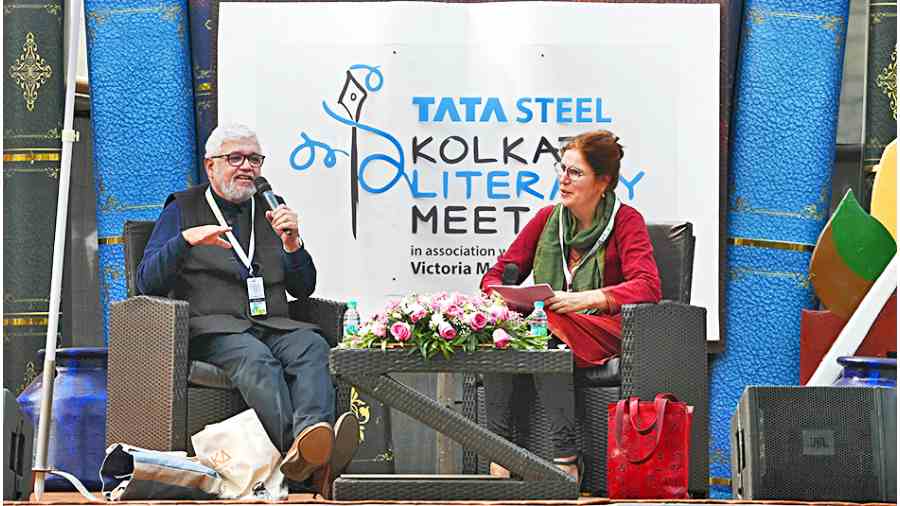A mad rush to have more pilgrims is destroying a pilgrimage in the mountains.
Silence, once inseparable from a mangrove delta at the tip of the sea, has now been replaced by loudspeakers.
Author Amitav Ghosh on Wednesday called out human interventions that were compounding the climate-change catastrophe.
“On the one hand, you have the catastrophe of climate change already unfolding. On top of that, you have patterns of human intervention that are compounding the disaster,” Ghosh said at the Tata Steel Kolkata Literary Meet, in association with the Victoria Memorial Hall and The Telegraph.
“What happened in Joshimath? It is such a profound irony that in your fervour to send more pilgrims, you are actually destroying the pilgrimage. The whole point of going on the pilgrimages of Kedarnath and Badrinath is that it is meant to be hard.... What is the point of a pilgrimage where you are shot up in these buses,” said Ghosh, who was in conversation with Annu Jalais, an environmental anthropologist.
Jalais, whose fascination with the Sunderbans led her to anthropology — she was awarded a PhD by the London School of Economics — is now an assistant professor at Krea University.
The conversation, titled Pandemic, Parables and Prophecies, saw the two discuss Ghosh’s recent books, Jungle Nama, The Nutmeg’s Curse and The Living Mountain.
“All over the world, people are increasingly organising themselves into movements where nature is increasingly part of their lives. But you have that on the one hand and on the other, you still have a lot of vested capital interests that are ultimately genocidal. How do you reconcile the two? How do you think this will play out in the coming years,” she asked Ghosh.
The “human interventions” made it difficult to be optimistic about the future, said Ghosh.
“I think it is going in a very very bad direction in every possible way,” he said.
“I visited the Great Nicobar islands in 2004, just after the tsunami. Now, they are going to shove off all the indigenous people, they are going to turn it into some kind of a tourist thing. They are doing the same thing with Lakshadweep. They are literally going under the water, as we speak. They have done away with so many kinds of environmental regulations…. Forests are being opened up to mining interests all across India,” said Ghosh.
Ghosh mentioned the Sunderbans, the backdrop of one of his most-loved books, The Hungry Tide.
“I must say that the biggest change that I saw in the Sunderbans this time, was the unbelievable increase in tourism. I mean, back then in the past, you would hardly ever see a tourist boat. Now, they were like hundreds, making an incredible noise, constantly going up and down. In fact, one of the most wonderful things about the Sunderbans was its silence. Now, there is never any silence. There are these loudspeakers constantly blasting. It has become a dystopia is all I can say,” he said.
Jalais said The Nutmeg's Curse — the 2021 book which looks at colonialism and environmental issues with particular focus on the Banda Islands off Indonesia— offers “a sharp critique of present society and reveals profoundly remarkable ways in which human history is shaped by non-human forces”.
She asked about the process that had brought Ghosh to the realisation.
The author went 23 years back, to a trip to the mangrove islands that Jalais was also part of.
“Almost to the week, 23 years ago, when we went to the Bonbibi puja in the jungle in the Sunderbans, with the villagers.... That was a completely unforgettable experience....That experience of being in the Sunderbans played a completely pivotal part in my life.
“Just seeing what was happening in the forest, already back then, even though I would not have called myself someone who accepted the realities of climate change.... But we could see the effects of seawater rise, of saltwater intrusion. After I published The Hungry Tide, then we could see even more, around 2009 when Cyclone Ailahit, what a devastating impact it had. I must say that what I have seen over the years in the Sunderbans, has made me genuinely terrified of what the future holds,” he said.
